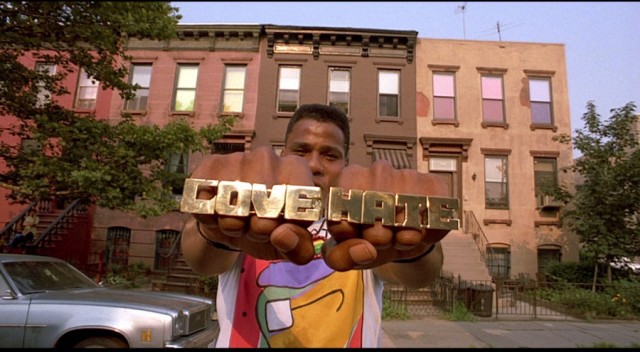From the Other Side of the Tracks to the Tenure Track: Chatting with a Humanities Prof
by Khadijah White and Ester Bloom

Ester: Good evening 🙂 I hear congratulations are in order?
Khadijah: I was a committee member for someone who defended his dissertation today. I signed for someone else to get his PhD. It was pretty cool.
Ester: That is really impressive. Conferring power and responsibility onto someone else! It’s like getting to knight someone, as a queen. So, for some background, can you tell the readers who you are and where you work?
Khadijah: Hi! My name is Khadijah Costley White — I’m a professor in the Journalism and Media Studies Department in the School of Communication and Information at Rutgers University. And, yeah, it did feel kind of cool that my signature actually meant something today. 🙂
Ester: Totally. So, in a general way, how did you get here? What’s your story? Were your parents academics? Did you realize when you were six that you wanted to grow up and teach communications-type things to undergrads?
Khadijah: Ha! No, I didn’t even know I wanted to teach communications type stuff to undergrads until a year or so ago. My mom’s not an academic — she’s the first of her siblings to go to college. And my father struggled with drug use and was mostly out of my life. He died when I was in high school. I didn’t even know being a professor was a job that I could consider until I was in college. Maybe not even an idea I took seriously until after I graduated, and even then I had many other fleeting dreams. I think, in general, I started with the things I loved and tried to figure out the different spaces that would accommodate that. And, somehow, that led me here.
Ester: That makes sense. What were some of the things you loved that made you think academics would be a good fit? And, if I may, how have you succeeded in a field that we all know is even more brutal than America’s Ninja Warrior?
Khadijah: Hm. I love to think, discuss, and debate. I love learning and I’m even more passionate about teaching. Watching people discover something they never knew before or see the world differently … I don’t know, maybe it helps me think that I’m making up for all the lousy teachers we all run into. But also, because being a professor gives me a lot of flexibility and space to do other things that I love to do outside of the classroom, which is connected to activism and community engagement.
Ester: I want to come back to the activism but first, before we get too far from the family background stuff, I’m curious whether you ever feel alienated from your peers in the Ivory Tower because of how and where you grew up. How open are you about your background? Do people know who you are, or do they assume you had a “Boondocks”-type of upbringing in the suburbs?

Khadijah: Hmm. I think I always felt odd, like I didn’t quite fit anywhere, for a variety of reasons. My mom put us in a predominantly white Christian school so that we didn’t have to go to the public schools in our neighborhood. So, I grew up learning to speak like my teachers and friends at school — with the vocal intonations and pitches that made me (and probably still make me) “sound white”. But my community, my church, my block, my family — they were all Black. And so there was always this tension, this feeling of traveling different worlds all the time and not quite fitting into either.
People now — I don’t know what they assume. I’ve had people say that I grew up bourgeois, which is hilarious because of the places I grew up living and the kind of financial instability we often had. My mom was single and resourceful — she always worked in offices, but it didn’t pay her enough to support four kids. And since I was the oldest, and she had me during college, I think I kind of had the bumpiest road in terms of resources. I could probably tell you some real sorrowful stories, but truth is that I always was surrounded by family that loved me and my needs were always met. That’s more than a lot of kids. The fact that I had less than other folks was just part of my story. The invisibility of class, though, can be really frustrating.
Ester: In what way?
Khadijah: In the way that, even as an adult, I’m constantly discovering all the ways that I’m “behind”. In high school, it starts with standardized tests and college applications — I was smart, in honors classes, but there was no way that I could afford SAT prep classes. I had less gifted peers whose parents paid Ivy League grad students to write their essays and put their applications together. I only applied to colleges that gave me fee waivers. In fact, I only applied to colleges that sent me applications — I didn’t know you actually had to request them.
Ester: Wow, I hadn’t heard about parents actually paying grads to write undergrad admissions essays. I mean, I have been paid, as an adult, to write admissions essays for other adults, but morally that feels different somehow. (Though still squicky, which is why I stopped pretty quickly.) But yes, the invisibility of class is fascinating and complicated.
Khadijah: Yeah — and then you go to college and you wonder how people get by. I didn’t have money to see my family and I was two hours away. Finally my college roommate just gave me $20 and said “go home”. But even then, I knew my mom didn’t have the money to get me back. In fact, I sent money home to help my family out during college. And saved up to be able to land on my feet when I transitioned out. Years later, I just bought my house with my partner. I literally broke down crying a few times when I wasn’t sure we’d be able to make it, and knowing we had no one who could really help us if we somehow fell short.
But throughout grad school, you meet students whose parents pay their rent or bought their condo, slipped them money for a down payment. And it’s not really something that people talk about, we just sit back and wonder at their good fortune at making excellent job connections or getting a beautiful home, never linking it to all the stuff they were born into.
Ester: Well, sure, of course. They worked for all that, okay? They worked hard. And they probably did, honestly! Just, you know. Not as hard as other people who didn’t start out with tons of advantages. It’s like the “born on 3rd base; thought they hit a triple” thing.
Khadijah: Exactly. Except everyone else thinks those people hit a triple, too. And they see me, and sometimes I think folks just assume that I’m the same way. I’m not. Even in grad school, people forget that you don’t just have parents supplementing your income. I was still helping my family out throughout that time, too.
Funny thing is though, I think it taught me to always save. Because we were always stretched for money (I could tell you some embarassing scenarios — like, for instance, I never actually received my high school diploma), saving money always feels like security to me. I get super panicked if I’m not saving.
Ester: So was grad school an easier environment in certain ways than college, because by that point you’d been an adult longer and were more able to support yourself and more comfortable blending into those middle class environments? Or was it harder because more of the people were of a uniform background that was different from yours? (I imagine the higher you climb, the fewer other people you encounter who were able to wrench themselves out of difficult circumstances.)
Khadijah: Hm. I think grad school was harder. At least in college, you don’t pay for rent or food, and at Swarthmore all events and healthcare are pretty much covered. But, in grad school, I think you go to colleagues’ apartments or you realize that one of the people in your cohort is ACTUALLY an heiress (and another one’s family owned an island off the coast of Providence) … A good number were children of academics and almost all were solidly upper middle and middle class. The divide is stark. And to be Black and a woman, in the midst of one of the poorest and Blackest cities in the country, and realize that all your colleagues discussed were movies and pets …
Like I said, always felt like I’m from a different world.
Ester: That city, btw, that would be Philly?

Khadijah: Yes, Philly. I actually attended a protest/demonstration/public hearing on a ban the mayor was trying to implement against feeding the homeless and ended up arrested. I actually got called into the Dean’s office. In grad school. Activism was just unheard of.
Ester: Like they would have called you to the Principal’s Office if they still had a principal. That was the protest where your finger was broken by a cop?
Khadijah: Yeah, the day before I was supposed to receive a graduate student award from Penn. The thing is, because I’ve always felt kind of like I don’t quite fit, I’ve gotten pretty good at cutting out spaces for myself (like most people, I guess). So, I’ve also gotten through by finding other friends who dealt with working-class backgrounds and could relate to dealing with a university that is filled with people who just don’t get what means. Really good friends who understood and were going through their own stuff that they had no space to talk about, who were desperately trying to figure out if schools with billion dollar endowments might give them enough money to pay their rent and eat the following year.
Ester: That’s great. I’m glad you have found your people — that’s key. Do you feel like your family understands what you’ve done? Are they bemused that you’re teaching 18-year-olds about the media? Or does it make sense to them as a career path? Is this where they hoped you’d land?
Khadijah: My family has been the key reason I’ve always been able to push myself forward. They always tell me how proud they are of me, the way I stand up for myself, resist what people try to convince black girls they should believe about themselves, and they’re super supportive. My grandmother, who was a housekeeper and never learned to read very well, used to buy me boxes of books from thrift stores during the summer. I was the kid they could brag about, the one who made it. I still am. It makes me so happy to feel like I’ve put all their love and support to good use. I hope 🙂 But they don’t really get what I do. It doesn’t seem real, the way other jobs do.
Ester: Yeah, that makes a lot of sense. Like, oh, a doctor! Great! Oh, wait, not that kind … ?
Khadijah: They’re proud that I’m a doctor. It’s a community accomplishment, not just an individual one. I am because they were and are, if that makes sense. So I’m proud that this is a gift I can bring to them.
Ester: Right. You write a lot about intersectionality —
Khadijah: Well, yeah, I mean, simply put, it’s thinking about all the ways that oppression intersects and produces different types of impact. So being a Black gay man has its own forms of oppressions, and privileges. Mostly the term is useful in thinking about policies that end up hurting some people more than others.
Ester: Right. We all remember Gawker’s privilege tournament, the Oppression Olympics, I’m sure.
Khadijah: LOL. I try not to.
Ester: How do you feel now teaching at Rutgers? Even if the other members of the faculty come from pretty uniform class/race backgrounds, I imagine the students are more diverse than those at Penn.
Khadijah: I’m in academia, where everyone is a hustler, so I don’t know if anyone is ever supposed to say how much they’re in love with where they are. But I am — my mom almost went to Rutgers. It’s one of the best schools in the country when it comes to generational class mobility. And it’s super diverse, lots of first-generation college students and students of color. So I feel like I get to teach kids more like me. I haven’t had that before. I’m grateful for that. And on top of that, I have really brilliant colleagues who are committed to social justice. I mean — I’m in a UNION? How’d that happen?
Ester: You’re in a union? That’s amazing. So retro. I know a grand total of one person who’s in a union in New York. She’s basically a unicorn. Do you get together and sing hymns? Pledge allegiance to the Communist party?
Khadijah: Um, I’m not really allowed to talk about that, Ester. It’s kind of like fight club, except with academics. So, um, not like fight club at all.
Ester: Hahaha fair enough. Well, I’m glad you’re in a place where you feel kind of at home at last. Any final words for our readers? What you’ve learned climbing a ladder few people expected you to even reach?
Khadijah: Ha, I think people are still shocked. I’M still shocked. I guess the only thing to always have is flexibility, trying to figure out the skills you have and your passions, and figure out the many different spaces in which they can fit. And be resourceful as hell. In America, there’s always someone trying to look good by giving someone charity. And that may very well be your way to gain some equal footing. Oh — and never be ashamed of getting help. No one reaches their goals on their own. Not one person in the entire world. Some of us are just brave (and smart) enough to admit it. And pass it on.
Khadijah White, Ph.D. is a researcher, producer and videographer. She is currently an assistant professor in the Department of Journalism and Media Studies at Rutgers University in New Brunswick.
Support The Billfold
The Billfold continues to exist thanks to support from our readers. Help us continue to do our work by making a monthly pledge on Patreon or a one-time-only contribution through PayPal.
Comments